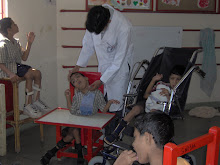Chairside management under LA 

or
Management Under GA or Nitrous Oxide 

| ||
| | Prof Dr Amitha Hegde | |
|
| ||
| ||
| | |
Our Take
As a site that has been stressing the improtance of prevention, we ideally believe that we should prevent the child from ever requiring operative treatment. However, blissful as this scenario may seem, it is highly unlikely. After taking into consideration the opinions of our experts the editorial team of DCSN recommends that every child must be given a chance to cooperate. We would be failing as pedodontists if we did not attempt to manage the child on the dental chair. We understand that this may not always work, and that invariably a few children will have to be posted under General Anesthesia, but we do not subscribe to the philosophy that a possible failure to manage the child on the chairside is reason enough to defer treatment to the operating theater.
Our Advice to parents is that, you must give your child every right to co-operate on the Dentist's chair before you agree to let the child be placed under general anesthesia.
Dr Sharat Chandra Pani
Editor
DCSN








2 comments:
Pediatric dentist are no doubt adept at managing children a lot better and special children require a different approach. After all, cooperation for treatment happens only after effective communication can happen between the dentist and the child. i would however beg to differ with our collegue who prefers to shoot pediatric dentist who use GA(may our pediatric dentist tribe increase!!) that it is essential to grade special patients to be posted under GA. Itis like giving a diagnosis of dental caries to wide range of spectrum of lesions from a white spot to grossly destructed tooth. A child with mild problems is definitely a patient for LA and dental chair but in cases where the enforced treatment is likely to result in more harm and risk due to unobtainable cooperation, it is worthy to post under GA. Moreover, posting is not a child's play, since most of these patients are not ASA 1 or 2 but ASA 3 or 4. so a pediatric dentist who posts these patients fully understands the risk/benefit ratio of such a procedure. kindly provide specific info about special patient subgroup before asking for opinion
i agree with you 100% even the behavioural management is the hardest way to treat the special needs but it the way to use your talent and enjoy the love response of the child when cooperate
it may took more time and effort but it is rewardable way of treatment
Post a Comment